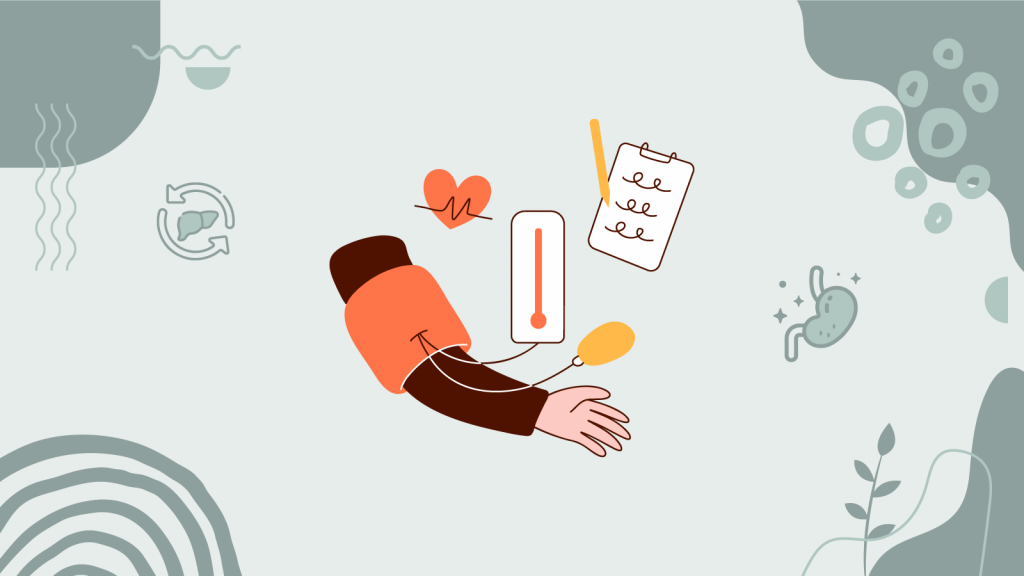“Unclear thoughts, sadness overpowering, unable to understand, what’s that devouring?”
Wondering why you are feeling confused without any reason, why your thoughts are not clear, and why you are getting anxious for no reason?
This is nothing but stressing over something that you are unaware of. To understand the reason behind your behavior, you have to analyze yourself and look for the signs that are making you uneasy. Only then will you be able to understand the causes and take the necessary actions to reduce your stress level.
Many events or changes are happening in one’s life, which are the primary reasons anyone struggles with stress. If you are looking for effective methods to reduce your stress, you need to understand the signs and symptoms to lead a happier and healthier life.
Let’s explore more about the signs and symptoms of stress and understand how stress appears in our bodies, minds, and behaviors.
Physical Stress Symptoms
Stress is more capable of catching you physically and affecting your body in multiple ways. It becomes important to understand the signs of stress to manage it better.
#1: Aches and pains
Have you found yourself rubbing your neck and shoulders more often after a long day of work and other responsibilities? This is a sign that you have poor posture and that your body is reacting to stress. When stressed, your muscles tense up as a protective mechanism and prepare for the “fight or flight” response. If this stress continues, it will lead to chronic aches and pain, affecting overall health.
#2: Decreased energy and insomnia
Lately, you have been feeling low on energy. You no longer feel as active as you used to, and your desire to work and competitiveness are dying somewhere. You are not the person that you used to be. You are always tired and always want to stay in bed.
This is one sign of stress. Another is that you are having trouble sleeping at night. Your mind is full of thoughts, making it hard to fall asleep peacefully. Your sleep-wake cycle is completely ruined, resulting in fatigue and tiredness during the day.
#3: Skin Conditions
Our young generation is more focused on their appearance and how their skin looks. However, with the increase in population and pollutants, having a normal skin condition has become difficult.
In addition, our skin suffers from more pimples, rashes, or flare-ups of conditions like eczema or psoriasis during stressful periods. This is because stress triggers inflammation and hormonal changes in your body, leading to more sensitive and reactive skin. These symptoms on your skin can be seen when you are stressed.
#4: Chronic Pain & Headaches
If you are in a stressful situation and have a pounding headache, you are not alone. Stress makes your head and neck muscles contract, resulting in headaches or migraines. To avoid these chronic headaches, you must understand the signs and causes of stress and opt for healthy living by exercising daily, practicing mindfulness, or taking short breaks throughout the day.
#5: Frequent Sickness
Are you frequently getting sick and catching viruses very quickly? Stress might be the reason behind it. If you are unaware and have been suffering from stress for a long time, chronic stress may be suppressing your immune system and making you vulnerable to infections and illness.
Your body is having trouble fighting bacteria, and you are frequently getting colds, flu, and other diseases. To boost your immune system, it is important to prioritize self-care and stress management.
#6: Appetite Changes and Weight Gain
Have you ever felt uneasy, anxious, and craving food for no reason? Stress eating is a real thing. At midnight, you may have unnecessary thoughts that make you unable to sleep, and suddenly, you may feel sad and crave something sweet to cheer yourself up.
Without realizing the consequences of stress eating, people constantly gain weight. On the other hand, some stressed people lose their appetite entirely. Both scenarios are caused by stress and affect normal eating patterns, resulting in weight fluctuations.
#7: Rapid Heartbeat & Sweating
Your work deadline is approaching, and there is not enough time to complete the project. This fluttery feeling in your chest makes you nervous. Your body starts releasing adrenaline, making you react to the perceived threat.
This reaction causes a rapid heartbeat and sweating and can be helpful in emergencies; however, chronic stress overworks your heart, increasing cardiovascular risk. Deep breathing and meditation techniques can be beneficial in these stressful situations.
Emotional Signs of Stress
Are your emotions out of your control and overwhelming you all the time? You might suffer from stress and need to identify these emotional signs to manage and reduce it.
#1: Anxiety, Worry, and Fear
You might have this unknown fear, making you feel worried and anxious for no apparent reason. This is one of the common signs of chronic stress. You might have a constant fear that something bad is going to happen. However, that might not be the case. You can participate in outdoor activities to maintain your mood and reduce stress.
#2: Irritability and Anger
You get angry or irritable over small things, and the situation worsens as time passes. You cannot control your anger and snap at your loved ones, even when they ask you a simple question. This makes your relationships suffer, which leads to an even more stressful life. You can practice mindfulness meditation to keep your mind calm and focused.
#3: Depression and Sadness
You no longer feel happy when you have been suffering from stress for a long time. Sadness and depression take over, and everything makes you unhappy, contributing to your mood disorders. You can actively participate in social gatherings, have deep conversations with your friends, or try to make new friends.
#4: Unable to Enjoy Things
Things that used to make you happy and excited no longer interest you. You have stopped enjoying your hobbies, and most of the time, you feel like doing nothing at all.
To overcome this situation, you can find new things that interest you or hobbies you can enjoy. You can also participate in activities you can share with your friends and family to help you cope with stress and anxiety.
#5: Getting Isolated
Feeling to stay isolated or away from others is a very common symptom of prolonged stress. You are having negative thoughts all the time, you feel insecure, or you have trust issues, which shows that you are suffering from stress and you are not bonding with other people is worsening the situation.
You can start interacting with others, participating in social activities, volunteering, or sharing your feelings with your close friends.
Behavioral Symptoms of Stress
Stress has a significant impact on behavior. When you are stressed for a longer period, it starts showing in your behavior. You start overreacting to minor things, you become a completely different person, and people around you can no longer recognize you for the person you used to be.
To avoid all these symptoms, you can try connecting with nature; keeping a journal will help you understand the causes and manage your stress effectively.
#1: Difficulty focusing
Have you ever been in a situation where you are trying to focus hard on a thing, but random thoughts keep running through your head, making it difficult to concentrate and leaving you feeling exhausted and anxious? Soon, you will start experiencing headaches and panic attacks due to an increase in your stress levels. Practicing meditation and yoga is the best way to cope with the focusing issues due to stress.
#2: Feeling pessimistic
You suddenly start having all those pessimistic thoughts, believing that nothing is going well in your life, that no one supports you, and that nothing is in your control. You start panicking with all the negative thoughts and feelings, blaming and questioning yourself.
To get rid of all these thoughts, you can write them down in a journal and then analyze them, or you can share your feelings with someone close to you and seek professional advice.
#3: Forgetfulness
Lately, you have been forgetting things. You go to the kitchen to get something, and as soon as you reach there, you completely forget what you are looking for. This condition starts increasing gradually, making you forget important and major things in your life.
To avoid these symptoms, you need to understand the cause of your stress and seek effective stress management solutions.
#4: Mood changes
Does your mood keep changing, like the weather? You are happy one minute and sad, depressed, anxious, or angry another. This constant change in your mood worries you, and you have no idea why this is happening to you.
The only answer to that could be that you are stressed. You need to find the root cause behind your stress and try to find the best solution. You can also try getting enough sleep, exercising, or changing your diet.
#5: Trouble making decisions
When you are stressed, it becomes hard to concentrate and make correct decisions. One simple decision can be overwhelming, and your thoughts may be disturbed. You find it difficult to process things in your mind and take action.
These are the symptoms of a highly stressed person. Meditations and deep breathing practices are the best solutions for that.
#6: Nervous habits
Several random thoughts keep running in your mind, giving you a sense of fear and making you anxious and nervous. You have symptoms like sweaty palms and forehead, biting your nails, and shaking your legs and hands.
This nervousness starts to turn into a panic attack, which is another stage of stress. Stress reduction techniques such as yoga and daily exercise can be the best solution.
Symptoms & Signs of Chronic Stress
Stress that lasts for weeks or months is considered chronic stress. There are several symptoms and signs of chronic stress that you need to take into account and work on stress management strategies before they become life-threatening.
#1: Cardiovascular Problems
If you have been suffering from stress for a long time due to your demanding job or financial worries, you are likely to have heart disease, hypertension, and stroke.
Studies show that ongoing stress can lead to a 40% increase in heart disease risk. In this situation, it becomes essential to take the necessary steps to reduce stress through relaxation techniques.
#2: Weakened Immune System
Long-term stress can result from several factors, such as caring for a sick family member, unhealthy relationships, or working in an unhealthy environment. These can weaken one’s immune system and cause colds, flu, and other infections more frequently, making one’s body weak to fight illness.
#3: Gastrointestinal Issues
Stress caused by life-changing events such as a breakup or moving for a long time can cause digestive issues such as acid reflux and irritable bowel syndrome, which cause your stomach to be constantly disturbed. Regular exercise and outdoor activities are the best solutions to avoid stomach-related issues.
#4: Mental Health Disorders
Suppose you have been dealing with ongoing personal or work-related stress for a long time. In that case, you are likely to have the risk of developing mental health issues that include PTSD, anxiety disorders, or depression. It becomes important to seek professional support to fight these issues and boost your mental health.
Conclusion
Stress has become a part of our lives nowadays. With a more demanding lifestyle and the inability to maintain a work-life balance, we are all surrounded by stress. Managing stress with practical strategies to live a peaceful and harmonious life becomes crucial at this stage. For that, you first need to recognize the signs and symptoms of stress and anxiety to understand the root causes and then work on the best-suited strategies to reduce it and boost your overall well-being.
“Healthy habits bring positive change, making you healthy, fit, and mind-sane!”
Sources
- American Psychological Association: Stress (https://www.apa.org/topics/stress)
- Mental Health Foundation (U.K.): Stress (https://www.mentalhealth.org.uk/a-to-z/s/stress)
- Yale Medicine: Chronic Stress (https://www.yalemedicine.org/conditions/stress-disorder)


















